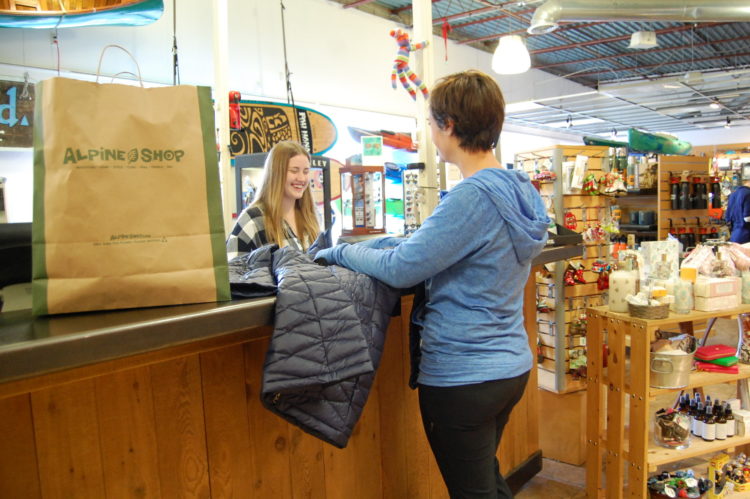This story was updated on November 24, 2020.
In the midst of holiday shopping season, manufacturers of gadgets and equipment for endurance and outdoor sports are flashing their wares everywhere.
Choosing a gift can be overwhelming, and choosing a place to shop can be just as overwhelming. With big box outlets, national specialty chains, and online discounters all vying for discretionary dollars, local retailers have to hustle for every bit of business.
“People have high expectations about the retail experience,” said Mike Weiss, owner and founder of Big Shark Bicycle Company. “It used to be that you could offer two of these three: quality, service, and price. Now, you have to give them all three.”
In delivering the trifecta, though, local shops provide ample reasons that prove their value to the region’s prosperity:
Creating jobs. Big River Running Company started in 2006 with two employees at one store. Today, it has 35 employees at three stores. Big Shark has grown since 1993 to three locations and 65 employees. The 47-year-old Alpine Shop employs between 90 and 120 people, depending on the season, at four locations. Browns Enterprises Inc. owns and operates three New Balance St. Louis stores in the metro area and employs about 40 people. It was founded in 1950 in Washington, Missouri.
Keeping money in the local economy. A study conducted by Civic Economics in 2012 compared 15 locally owned businesses in the Salt Lake City area with retail chains there. The findings: Local retailers return 52 percent of their revenue to the local economy, the chains just 14 percent.
“It’s the salaries that you’re paying the employees, sure,” said Kelley Elliott, marketing manager for New Balance St. Louis, “but it’s also the little league sponsorships and fundraising for local charities and the things you don’t necessarily think about.”
Kurt Brown, president of Browns Enterprises, makes dog treats in his home kitchen and sells them at the stores, with proceeds going to the Five Acres Animal Shelter in St. Charles. The company also collects prom dresses for its annual free prom dress giveaway, collects shoes to raise funds for Mothers Against Drunk Driving, and more.
Big River Running donates 10 percent of sales of all Big River branded apparel and accessories to support St. Louis charities through its Big River Gives Back program. The company recently presented a check for more than $10,000 to the Jackie Joyner Kersee Foundation through the program.
Even more reason to shop locally owned stores boil down to superior service. “It all comes down to retailers offering something more to the customers, a better shopping experience,” said Todd Oswald, Alpine Shop’s marketing director. Among those little extras you can expect at locally owned store include:
Connecting with a person. “When someone walks in, we have as many questions for them as they have for us — sometimes more. ‘How often do you run?’ ‘What are you training for?’” said Matt Helbig, owner and co-founder of Big River. “We want to get to know them so we can point them in the right direction.”
Getting it right the first time. “With boots, backpacks, and bikes, to name just a few items, you’re not getting the most out of a purchase if you buy online,” Oswald said. “If you go out and buy ski boots online, maybe they don’t fit right. Maybe you don’t use them as much as you would if they fit right. You’re not getting value. We can fit you in the store. You’ll use them more, and you end up getting more from your purchase.”
Product knowledge. The passion of local retailers is born of experience in endurance and outdoor sports. With that experience comes knowledge. “Every one of our employees has at least one sport or activity that they are passionate about and are considered an expert,” Oswald said.
Creating a friendly community for training. Each of the local shops we talked to offers an array of opportunities for learning and honing skills, from kayak lessons (Alpine Shop) to weekly group runs and technique sessions (Big River, New Balance) to training buddies and open-water swims (Big Shark).
“A robust local market enables the local retails to provide [these] services,” Weiss said. “Most of the events and training opportunities don’t make money or are revenue-neutral, but we do this because it brings people into sports and gives people a goal to train for. The repetition builds a loyal customer base.”
Hosting and supporting local races. Both Big Shark and Big River have branched out into race management, hosting their own races and offering timing services to smaller events sponsored by other organizations, many of them nonprofit organizations hoping to raise money.
Increased opportunities to try something new. “We don’t answer to shareholders, so we have freedom to take a chance on a small quantity of a new product, especially if it’s new or it’s local,” Helbig said.
Diverse product lineups. Big Shark carries 13 brands of bikes in eight different categories. Big box retailers might carry four or five brands in three categories. The variety makes it easier for a shopper to find just the right bike for their needs.
Instant gratification. “No matter how many reviews they read online or how good a deal they think they can get, people still need to try it on,” Helbig said. “They like knowing that you can try it and buy it and use it right away.” Big River even has running tracks or treadmills in each of its stores so shoppers can test-drive shoes without heading out into the elements.
Author: Kathleen Nelson is a regular contributor to Terrain Magazine.


Leave A Comment